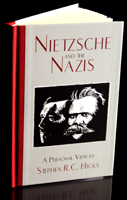[This is Section 36 of Nietzsche and the Nazis.]
36. Instinct, passion, and anti-reason
 Hitler was fond of saying, in private, “What luck that men do not think.”
Hitler was fond of saying, in private, “What luck that men do not think.”
Another significant point of agreement exists between Nietzsche and the Nazis: Both agree that the great conflicts will not be solved rationally, through the processes of discussion, argument, persuasion, or diplomacy. Both Nietzsche and the Nazis are irrationalists in their view of human psychology—and this has important social and political implications.
Think about democracy for a moment. In particular, think about how much confidence in the power of reason that democracy requires. Democracy is a matter of decentralizing political power to individuals by, for example, giving each individual a vote. The assumption of democracy is that individuals have the ability to weigh and judge important matters and cast a responsible vote. The expectation is that members of democracies will have ongoing discussions and arguments about all sorts of issues, and that they will be able to assess the evidence, the arguments and counter-arguments. And they will be able to learn from their mistakes and, when appropriate, change their votes the next time around.
It is not an accident that neither Nietzsche nor the Nazis were advocates of either democracy or reason.
Hitler considered a highly-developed intellect to be a weakness and too much reliance on reason to be a sickness. Germany’s recent problems, he believed, stemmed from too much thinking. “The intellect has grown autocratic, and has become a disease of life.” What Germany required was passion, a storm of emotion arising from deeply rooted instincts and drives: “Only a storm of glowing passion can turn the destinies of nations, but this passion can only be roused by a man who carries it within himself.”[119] Consequently, German training and propaganda were not directed toward presenting facts and arguments but rather to arousing the passions of the masses. Reason, logic, and objectivity were beside the point. “We are not objective, we are German,” said Hans Schemm, the first Nazi Minister of Culture.[120]
Here again there is an important connection to Nietzsche. Nietzsche too sees an opposition between conscious reason and unconscious instinct, and he disparages those who stress rationality—those who engage in what he calls the “ridiculous overestimation and misunderstanding of consciousness.”[121] In his own words, it is “‘Rationality’ against instinct,”[122] and he believes that rationality is the least useful guiding power humans possess. Humans came out of a long evolutionary line that relied on drives and instincts—and those drives and instincts served us well for millennia. Yet men eventually became settled, tamed, and civilized, and they lost something crucial:
“[I]n this new world they no longer possessed their former guides, their regulating, unconscious and infallible drives: they were reduced to thinking, inferring, reckoning, co-ordinating cause and effect, these unfortunate creatures; they were reduced to their ‘consciousness,’ their weakest and most fallible organ!”[123]
Note that Nietzsche says our unconscious drives are infallible, if only we can find them within ourselves again. It is our strongest, most assertive unconscious instinct that we should let rule our lives: “‘instinct’ is of all the kinds of intelligence that have been discovered so far—the most intelligent.”
And on this score, Nietzsche and the Nazis are in agreement: Both are fundamentally irrationalists—they do not think much of the power of reason, and they urge themselves and others to let their strongest passions and instincts well up within them and be released upon the world.
References
[119] Hitler, quoted in Langer.
[120] Schemm, quoted in Mosse 1966 xxxi.
[121] GS 11.
[122] EH: “The Birth of Tragedy” 1.
[123] GM II:16.
[124] BGE 218.
[Bibliography].
[Return to the Nietzsche and the Nazis page. Go to the StephenHicks.org main page.]
Hitler’s deteriorative ignorance,
Bedulling Germany, pursued mischance.